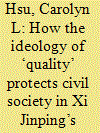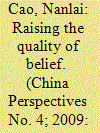| Srl | Item |
| 1 |
ID:
178171


|
|
|
|
|
| Summary/Abstract |
Under Xi Jinping, the Chinese state has asserted authoritarian control over many aspects of civil society. Yet there is evidence that Chinese citizens are continuing to mobilize and organize with relative levels of success. This article examines one mechanism that prevents the Chinese state from eliminating civil society: the political ideology of suzhi (素质), translated as ‘quality’ in English. In the post-Mao era, the Chinese Communist Party (CCP) has increasingly invested its political legitimacy in its ability to deliver a rising quality of life to its citizens. This dynamic means that it is possible for Chinese citizens to mobilize and organize to achieve their goals. Suzhi ideology gives citizens one set of means to effectively limit undesirable behaviour by the state. It also provides citizens with leverage to make the state respond robustly to their needs and desires. It opens up possibilities for citizens to solve social problems on their own, without recourse to state actors. This article will examine four arenas of Chinese civil society which suzhi ideology protects under the Xi regime: media-inspired public outrage; public protests and demonstrations; NGOs as state consultants; and the increased accessibility of litigation.
|
|
|
|
|
|
|
|
|
|
|
|
|
|
|
|
| 2 |
ID:
149311


|
|
|
|
|
| Summary/Abstract |
The notion of ‘suzhi’ (素质), which roughly means human quality or character, features prominently in public and intellectual discourses in China about the country’s social and political development, including the prospects for democratization. Despite the pervasive use of the concept by both the government and society, few studies have analyzed whether suzhi is really the root cause of the myriad social issues that have been attributed to it. This article problematizes the notion of suzhi and shows through simple game-theoretic analyses of two heavily debated issues in China that such a predominant focus on suzhi is misguided and misses the crucial role of social expectations in multiple-equilibria social interactions. In fact, without good social expectations even ‘high suzhi’ people would behave as if they were of ‘low suzhi’, which perhaps best characterizes many social phenomena in contemporary China. The results of the study thus have critical implications for a successful social and political transition.
|
|
|
|
|
|
|
|
|
|
|
|
|
|
|
|
| 3 |
ID:
092472


|
|
|